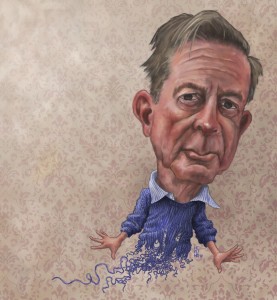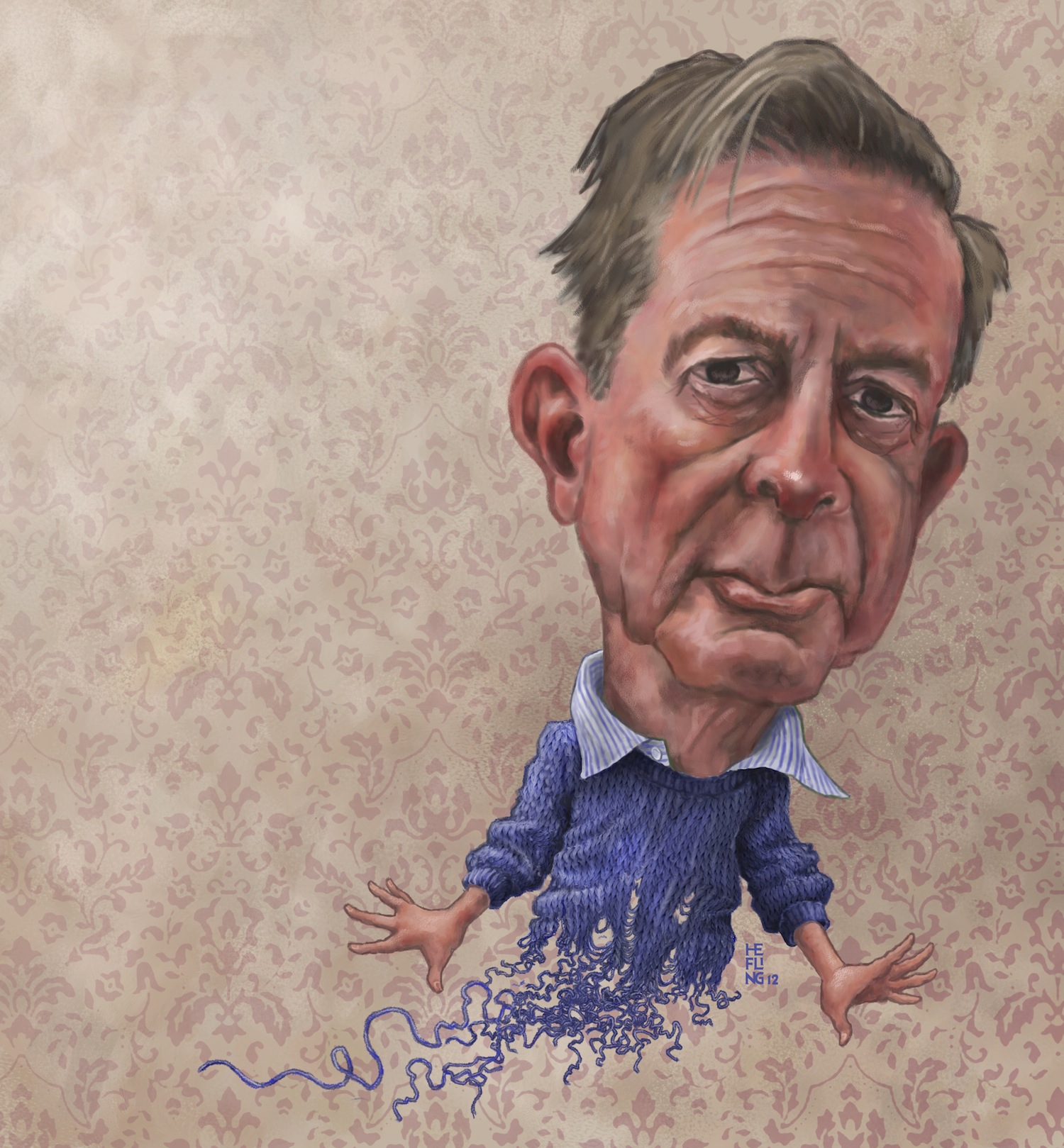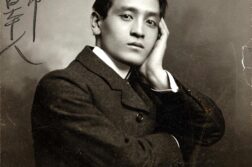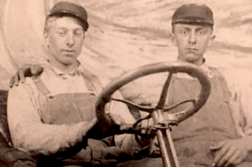“I WOULD NOT like to be the kind of writer through whose work one sees the leakage of some noisome semi secret,” John Cheever confided in his journal in an entry that begins by recording a quarrel with his wife Mary “about lingering glances.” He goes on to record that while traveling later that day on the night train from New York City to Boston to visit his mother during what would be her final illness, he found that the private compartment he’d booked seemed to invite “erotic misdemeanor.” He also records that, following his arrival, he flinched during his conversation with his mother when she observed that someone with whom Cheever had grown up was “a regular boy” (Cheever’s emphasis).
Cheever’s journals reveal his fear of his own homosexuality, in particular his fear that he might betray—or that others might perceive—what he is desperate to keep hidden: that his wife follows his gaze as it lingers on other men, that he indulges in an assignation with another man in the anonymity of a private train compartment, or that his highly critical mother caustically insinuates that he’s “irregular” sexually. For most of his career he found it necessary to scrutinize his work and his behavior for any evidence of “leakage” of that unspoken truth.
It bears noting that in Cheever’s mind his homosexuality was a “semi secret” and not a full-fledged one. “I have homosexual instincts and … they are a source of painful anxiety,” he confesses in his journal; “the thought of being a homosexual terrifies me.” But he seems to have been particularly worried, not that any “hint of aberrant carnality” that he might emit had already been recognized by other people, but that such information might circulate more widely and undercut his carefully constructed persona as a New England country gentleman. For example, his journals record innumerable arguments with, or extended periods of cold silence from, his wife, Mary, with whom he remained married for 41 years and raised three children. On one occasion he was chilled to overhear her ask guests at dinner, “What is worse for a woman: to marry a man with a bad prostate [and, so, who is sexually impotent] or to marry a homosexual?” His concern was not for the impossible situation that his sexual conflict had created for his wife, but that their dinner guests might infer his secret from Mary’s loose talk.
Cheever’s journals and letters reveal his disgust with the type of “offensive homosexual” increasingly in evidence on the streets of New York beginning in the late 1960’s—long-haired men in tight jeans whose very manner of walking seemed to announce their delight in “taking it up the ass.” Clearly, the lack of discretion evinced by such men concerned him more than their presumed sexual propensities. Yet Cheever’s own drive to have sex with other men was so strong that once he discovered that the public lavatories in Grand Central Station offered around-the-clock opportunities for homosexual hook-ups, the temptation to indulge himself proved so great that he came to feel “threatened by an erotic abyss” when taking a train into or out of the city.
 “I suffer, from time to time, the painful need for male tenderness, but I cannot perform with a man without wrecking my self-esteem,” Cheever wrote with admirable objectivity around 1968. Such perpetual tension contributed to what he sardonically termed “my gin-drinking distemper”—that is, an alcoholism so extreme that he eventually suffered multiple grand mal seizures attributed to what was then called Organic Brain Syndrome.
“I suffer, from time to time, the painful need for male tenderness, but I cannot perform with a man without wrecking my self-esteem,” Cheever wrote with admirable objectivity around 1968. Such perpetual tension contributed to what he sardonically termed “my gin-drinking distemper”—that is, an alcoholism so extreme that he eventually suffered multiple grand mal seizures attributed to what was then called Organic Brain Syndrome.
Cheever’s sexual anxieties became deeply rooted during adolescence. As an adult, he recognized that for his younger self, “homosexuality seemed to me a lingering death. … If I followed my instincts I would be strangled by some hairy sailor in a public urinal. Every comely man, every bank clerk and delivery boy, was aimed at my life like a loaded pistol. … But now I seem to see it clearly. Homosexuality is not, as I live it, an evil. The evil is anxiety, an anxiety that can take on all the shapes and colors of hopeless passion.” Unfortunately, however lucid Cheever could be at times about his condition, he was never fully able to control his anxiety and give himself over to a hopeful passion with another male (at least possibly not until the last years of his life). “The feeling always was that if I could express myself erotically I could come alive,” he confessed in his journal. But try as he might, he could never unburden himself of his painful secret by sharing it with others.
Following his death, his son Ben recalled that, although Cheever repeatedly warned his children that they must never look into his journals, he regularly left these notebooks lying about the house, as if to invite family members to discover his secret on their own. On occasion in later life he would actually hand a volume of his journals to a friend or family member, and would sit in the room with tears streaming down his face as his companion read the revelations it contained of his lifelong loneliness and an unhappiness of which he still could not speak even after the friend had finished reading. Shortly before he died, Cheever asked permission to meet with his elder son’s analyst, but proved too ill to go through with it. Over the telephone he revealed that he had wanted the analyst to impart to Ben the secret that he could not bring himself to share directly with his son, no matter how much he longed to do so.
Last year, we celebrated both the centenary of Cheever’s birth and the thirtieth anniversary of his death. He remains post-war America’s greatest writer of short stories and chronicler of the social triumphs and spiritual vacuousness of the upper-middle class. Significantly, although deeply conflicted sexually, Cheever was able to write of the hope of living with “Love! Valor! Compassion!” (a phrase from his journals that was the title of Terrence McNally’s powerful 1994 play about gay life in the Age of AIDS). Cheever’s sexual conflicts are recorded in the journals, which his editor estimates run between three and four million words (less than 100,000 of which appear in print). Today they constitute as significant a portion of his literary legacy as do his Collected Stories (2009). They made it possible for Blake Bailey to write an unusually frank biography of the writer in Cheever: A Life (2009). Cheever’s private term for his “ravenous [sexual]versatility” was “iridescence.” What allowed the man in the proverbial grey flannel suit to glimmer and glow? His centennial invites an examination of this mystery.
“THE POSSIBILITY of my falling in love with a man seems to me to exist,” Cheever told his daughter Susan, a writer for Newsweek magazine assigned to interview him following the publication of his fourth novel, Falconer (1977), whose story of a gay love affair in prison unsettled many of Cheever’s readers. “Such a thing could happen. That it has not happened [to me]is just chance. But I would think twice about giving up the robustness and merriment I have known in the heterosexual world.” In the same interview he mischievously replied, when asked directly whether he had ever had a homosexual experience, that “My answer to that is, well, I have had many … all tremendously gratifying, and all between the ages of 9 and 11.” Cheever’s response to his daughter’s question was true to form in that he revealed part of his secret, then qualified it; seemed willing to lift the veil, only to drop it down again heavily; raised the possibility of a “semi secret,” only to deny it.
Throughout his life, the appearance of both sexual normalcy and social refinement was tremendously important to Cheever. Humiliated early in life by his mother’s need to open a gift shop to support the family when his father proved incapable of doing so, in mid-life Cheever would take pleasure from assuming the guise of the upper-middle-class householder about whom he wrote in his stories, going so far as to borrow a horse on which to sit like a suburban country squire when a magazine writer and photographer came to interview him. Likewise, no matter how viciously he quarreled with his wife, he went out of his way to suggest their sexual concord whenever guests were present. Not surprisingly, although he boasted in letters to friends of his affair with actress Hope Lange, his journals record his frustration with how seldom she would actually have sex with him.
Behind a façade of suburban regularity and heterosexual bliss, Cheever’s sexual reality was that he was constantly horny (“my love muscle is restless,” he would write in his journal, or “my muscle keeps up its nagging and complaining”), but was constitutionally incapable of enjoying a mutually satisfying sexual and emotional connection with another person. His lack of concern for his female partners’ pleasure is suggested by a letter written in 1977: “I expect you’ve lived with enough women to know that many of them get orgasim [sic]mixed up with punctuality in meeting common carriers. You can blow them, fuck them, bite them and suck them but you may not discover, until it’s too late[,] that the only way you can get them to board the train is to beat them around the ears with the [eleventh]edition of the Encyclopedia”—that is, a woman needs to reach orgasm before the man’s phallic “train” pulls out of the “station.” And in his sexual relations with other men, he seems never to have progressed beyond the mutual masturbation of adolescent sexual experimentation. (He was possibly initiated sexually by his older brother Fred, with whom he spent the summer of 1931 backpacking through Europe and with whom he shared a bed following the decline of his parents’ fortunes.) He did, however, boast of his willingness to be fellated: “Fellatio is the nicest thing one human being can do for another,” he shocked a writing class at the University of Iowa by saying in 1973, yet it is unclear if he was ever willing to reciprocate the kindness.
The pattern that emerged with most of his male partners was that he boasted to select third parties of how well he’d been serviced sexually by a new partner while openly disparaging that accommodating person’s homosexuality. Cheever was thereby able to fashion himself as a man of the world with wide-ranging sexual experience who was so confident in his heterosexuality that he could afford to be generous to a pathetic cocksucker. For example, he seems to have taken particular pleasure in denigrating the Pulitzer Prize-winning composer and celebrated diarist Ned Rorem, whom he met while in residence at the Yaddo artists’ colony. Rorem was everything that Cheever was not: cultured, well educated, widely traveled and well connected socially, not to mention classically handsome and sexually charismatic. (In his journal, Cheever rues that “I am a small man, small feet, small p— – k, small hands, small waist.”) While at Yaddo Cheever and Rorem had an affair that Cheever apparently enjoyed. Yet several years later Cheever cattily wrote a young writer who was about to stay at Yaddo for the first time that the young man would meet there “a former male beauty named Ned Rorem. Years and years ago he sucked my cock three times a day for three days. I can’t remember what it was like but it must have been good because I wouldn’t have kept coming.” In reality Cheever was not as blasé about the affair as he pretended, for biographer Bailey reports that within a year of writing this letter, Cheever showed up at Rorem’s apartment in New York City, dropped his pants, and chased Rorem about the room protesting his loneliness and begging to have sex.
Needless to say, Cheever’s journals—in which he writes with a self-flagellating honesty—tell a very different story than that of the self-fashioned sexual buccaneer who appears in his letters. Consider his contradictory representations of handsome, openly gay fiction writer Allan Gurganus, who was some forty years Cheever’s junior when they met at the University of Iowa while Cheever taught creative writing there. Cheever quickly became smitten with Gurganus, helped publish his first short story, and recommended him for a fellowship at Yaddo when Cheever would also be in residence. Despite the fact that he suffered severely mixed feelings for Gurganus, Cheever pursued him for months following their shared residency. On the one hand, Cheever was frustrated that the younger man wore his hair long and his trousers tight, and that he regularly had sex with strangers whom he picked up in gay bars. Yet in his journals Cheever emerges as a forlorn maiden desperate to hear from the gadabout Gurganus: “There is no letter from A., and I wait for the mail.” His despair is colored by sexual jealousy of the younger, more attractive man who had so many more sexual opportunities available to him than Cheever himself had: “No word from A.; as I might say, Can’t you take his cock out of your mouth long enough to write a postcard?”
Not surprisingly, in the same letter to the young writer in which he disparages Ned Rorem, Cheever mocks Gurganus, who had occupied a prized room at Yaddo in the main building’s tower the previous season. “Gurganus had the room last year and got sore as hell when I called him Rapunzel. His hair was very long. Gurganus is brilliant but he suffers acutely from the loss of gravity that seems to follow having a cock up your ass or down your throat once to [sic]often.” Cheever, who read Gurganus’ openness about his sexuality as effeminacy, thus salved his own wounded pride in his journals by feminizing the object of his desire: “the more he flirts, the more he seems like a woman. He shifts his shoulders, swings his hips, and gives me long, bone-making gazes.” Cheever is equally offended that Gurganus should admit his own sexual desires so frankly, and that he himself should becomes sexually aroused in Gurganus’ presence.
In his journals and letters, Cheever attempted repeatedly to distance himself from gay men who refused to keep their sexuality a secret. There is a pathological nastiness in his attempt to assert his superiority over openly gay men and distance himself from their supposed effeminacy. Consider this letter, which records his observations about two gay men that he saw one morning at the local post office. Cheever seems particularly offended to have run into “Them” in one of the most public spaces in town: “in the parking-lot that serves the post-office, the super market, the cut-rate drugstore, liquor store and dry-cleaner.”
They arrived in a Mercedes 300, beautifully washed and polished. “You wash the car, Michael, I’ll wash the sweaters.” … The old one was very skinny with a few strands of hair, dyed a marvelous yellow. The youth had all his hair and everything else, I guess, and he might have seemed quite beautiful if he didn’t have a mouth like an asshole. The old one would be seen to talk as if his asshole were a mouth. In the back seat was an obligatory Mastaff [sic], a massive, ornamental, brainless dog named after some international cocksucker. “He’ll keep me company when I am abandoned by Michael,” the old fairy will tell his guests. Having judged their environment to be loathsome they removed themselves from the Mercedez [sic]. Then they took from the back seat a large, beautifully wrapped box containing, I’ll bet, a lamp base, thrown by the old one (a potter) on his favorite wheel to be mailed on consignment to a former Golden Gloves runner-up who had just opened an antique shop in Savanah [sic]Georgia. The message seemed to be that if you take it up the ass once too often you lose the blessedness of locomotion.
Cheever seems resentful of their obvious affluence (a Mercedes-Benz) and lack of domestic obligations—whereas he himself brooded constantly over money and was sensitive to any social slight (“they sneered in fact at me,” he protests elsewhere in the letter). But he is driven to pathological disdain in his attempt to imagine the circumstances of the couple’s shared life.
Ironically, this letter was written to Max Zimmer, whom Cheever had met when Zimmer was a graduate student at the University of Utah, where Cheever was invited to read. Zimmer eventually left his girlfriend and followed Cheever to New York City, where he became, according to biographer Bailey, Cheever’s reluctant sexual partner, complying because he was financially dependent on the older man (much like the younger man at the post office). Max worked occasionally as a handyman at the Cheever house in Ossining, chauffeured Cheever to readings and to doctor’s appointments, and helped him through his final illness. He was accepted by Cheever’s wife and adult children as a member of the family. But Cheever never acknowledged to others the intimate nature of his relationship with Zimmer. Cheever’s elder son Ben was startled to learn how important the pair’s sexual activities were to his father only when he read the latter’s journals. Although he’d often been in their presence during his father’s last years, Ben never suspected that they were regularly having sex together, because Zimmer, like Cheever, seemed so “regular.”
The importance of this relationship with Zimmer is revealed in a deeply moving letter written a year before Cheever’s death:
I woke this morning with a hard wet cock and it’s wet now after talking with you [on the telephone]but this isn’t all of it; it’s talking about the impossibility of teaching and writing and happily eating a New York Steak at a place called the firehouse … and laughing and throwing snowballs and you complaining about my tobacco cough and the size of my cock. … I have thought for a year that such love must be perverse, cruel and inverted but I can find no trace of this in my love for you. It seems as natural and easy as passing a football on a fine October day. … Both your short life and my long life have been, it seems to me, singular adventures and to hold your nice ass in my hands and feel your cock against mine seems to be a part of this astonishing pilgrimage.
This erotically grounded spiritual bond (“this astonishing pilgrimage”) is similar to the relationship that Cheever dramatizes in Falconer, his most openly gay novel, in which Farragut, imprisoned for fratricide, is redeemed by love and released from the prison of the self when he has an affair with a fellow convict. But even when Cheever found himself finally able to “express myself erotically” and to “come alive” after years of shame and self-hatred, he remained unable to share with others the quiet joy that he had discovered with Max.
“I think of love’s two aspects: all that is gold and splendid, even the dust under the bed, and that other creation of soiled underwear and sidelong glances; both being a part of my nature,” Cheever wrote in his journal. Even in his last years, when he seemed most fulfilled sexually and emotionally, he was unable to overcome his adolescent shame and reconcile these two aspects of love. The “erotic abyss” in which he was consequently forced to live was entirely of his own making, he understood only too well. But he was never able to free himself once and for all from his “noisome semi secret.”
Raymond-Jean Frontain is professor of English at the University of Central Arkansas and editor of the academic quarterly ANQ.






